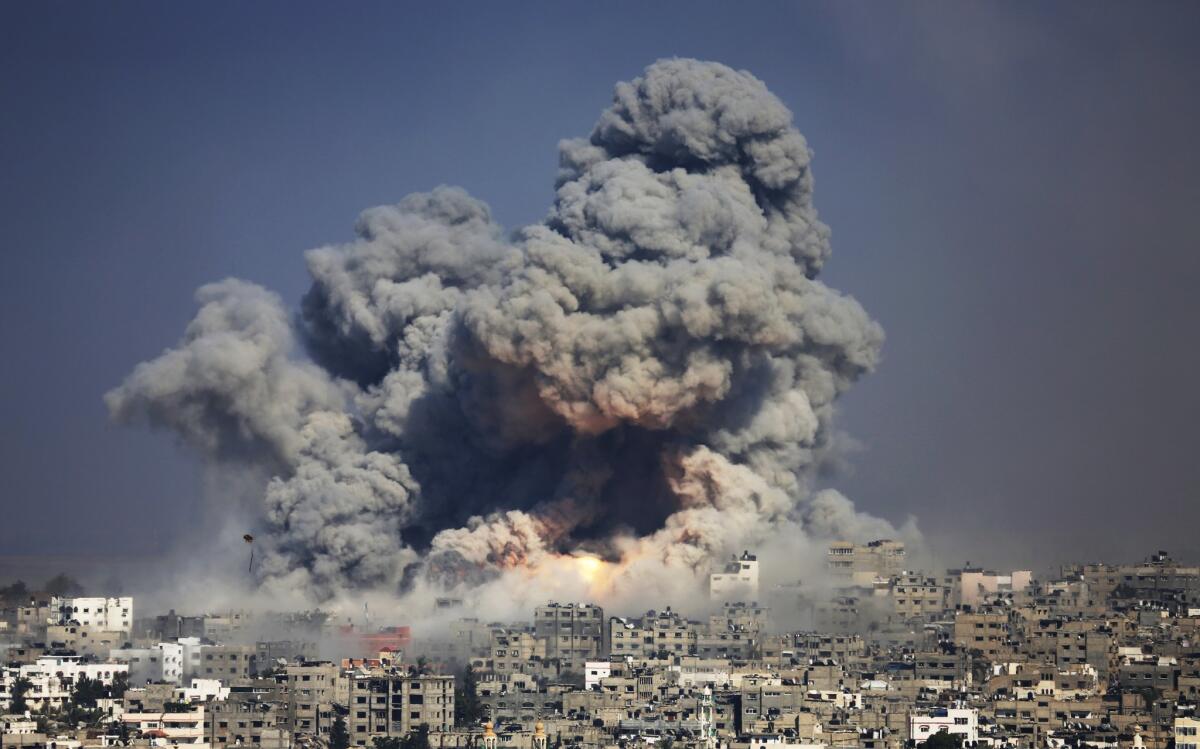Israel orders more probes of suspected crimes by its forces in Gaza

- Share via
Reporting from Jerusalem — Israel has ordered criminal investigations of eight incidents of suspected violations of international law or military commands during the Gaza war this summer, Israel’s military announced.
Israel’s military advocate general, Maj. Gen. Dan Efroni, announced the decision as part of the army’s investigation into irregular incidents during the war, according to an army statement issued Saturday. These included multiple fatalities among Palestinian civilians and attacks on international facilities and medical agencies.
The new criminal investigations come in addition to five previously announced in September, as the army continues to examine cases referred by non-governmental organizations alleging criminal conduct by Israeli forces.
Eighty-five cases are under review by Efroni and the army’s Fact Finding Assessment Mission, an internal investigation agency comprised of six teams staffed by senior officers outside the chain of command during the fighting.
Among the incidents to be probed is a strike on a Palestinian home in Khan Younis on July 20 that killed as many as 27 members of the extended Abu Jami family. Efroni ordered a criminal investigation of the incident based on findings of “grounds for a reasonable suspicion that the incident involved deviation from the rules and procedures applicable” to Israel’s military.
Another case to be investigated involves the allegation that Israeli forces shot and killed Mohammed Tawfiq Kadiach (also spelled Quadeeh) as he was waving a white flag during an Israeli operation in Khuzaa, an area of Khan Younis devastated by particularly fierce fighting while civilians were trapped in the neighborhood. The Israeli soldiers are also accused of using other members of Kadiach’s family as human shields.
Additional cases to be investigated include the deaths of two Palestinian ambulance drivers in separate incidents, as well as four cases of suspected looting by Israeli soldiers.
Efroni also released details of seven other cases that he reviewed and closed, citing a lack of reasonable grounds for suspected criminal behavior.
One occurred on July 8, when at least six members of the Hamed family were reported killed in an aerial strike on their home. According to the army, the target of the strike was Hafet Hamed, a senior military commander of the Islamic Jihad, who was standing outside the family home with several militants he was believed to be briefing.
The army said precautions were taken to minimize risk to civilians, including using precise and relatively low-explosive munitions and that no civilians were spotted in the area at the time.
Efroni ruled that the procedures had been in keeping with international and Israeli law as a strike against a military target that was properly authorized and took adequate precautions.
Another case closed was the allegation that an Israeli airstrike on medical clinics outside the Shifa hospital and a park in the Shati refugee camp killed 10 people, including 9 children, on July 28.
The army’s investigation did not identify a corresponding Israeli strike at that time, and determined that the victims were killed by Palestinian rockets.
Israel launched a fierce military assault against the Gaza Strip in July to curb rocket fire into Israel and destroy military infrastructure belonging to Hamas and other militant groups in the coastal Palestinian enclave.
Fifty days of Israeli airstrikes and ground operations left more than 2,100 Palestinians dead, mostly civilians, according to international organizations, and caused widespread destruction of civilian homes and infrastructure.
Most of Israel’s 72 casualties were soldiers killed in or around Gaza, except for six civilians killed by some of the thousands of rockets launched into Israel during the fighting.
A month ago, Amnesty International published a report accusing Israel of brazenly flouting international law and showing a “callous indifference to the carnage” caused by strikes on Palestinian civilians. The organization said some of Israel’s actions amounted to war crimes.
Israel has rejected a panel appointed by the United Nations Human Rights Council to investigate allegations of war crimes, calling it biased, and recently denied entry to the panel’s members. However, Israel appears to be willing to cooperate with a different panel appointed by U.N. Secretary General Ban Ki-moon.
On Sunday, another court case against Israel’s military opened in Jerusalem. The trial involves a civil lawsuit brought by the family of a California activist, Tristan Anderson, who was shot by Israeli forces five years ago, leaving him with permanent brain damage.
In 2009, Anderson was a 38-year-old activist and photographer visiting the West Bank for an up-close view of the conflict and attending Palestinian demonstrations.
He was documenting weekly protests against Israel’s construction of the controversial separation barrier in the village of Ni’ilin when he was shot in the head with a tear gas grenade fired by Israeli forces trying to break up a Palestinian demonstration.
The high-velocity metal canister has a range of range of several hundred yards but was allegedly fired at close range and against regulations, cracking Anderson’s skull and causing traumatic brain injury. After months of surgery in Israel, Anderson returned home to Oakland and remains impaired.
Israeli authorities investigated the incident at the time but closed the case after finding no criminal responsibility on the part of security troops involved.
A series of appeals filed by Nancy and Michael Anderson, Tristan’s parents, met with similar results. But last year, Israel’s high court ordered that the investigation be reopened.
Filed through an Israeli human rights advocacy group, the Andersons’ petition alleged there were fundamental flaws in the Israeli investigation, including interviewing the wrong soldiers and failing to visit the actual site of the incident.
Sobelman is a special correspondent.
More to Read
Sign up for Essential California
The most important California stories and recommendations in your inbox every morning.
You may occasionally receive promotional content from the Los Angeles Times.










